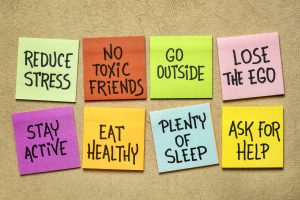By – James M. Katz, BA

Stress Reduction Strategies are used to combat stressors in our daily lives. Stress is a common experience that affects everyone at some point in their lives. It can be caused by various factors, such as work pressure, personal relationships, financial difficulties, and health issues. When we are stressed, our bodies release hormones like cortisol, which can have negative effects on our physical and mental well-being.
Chronic stress can lead to a range of health problems, including high blood pressure, heart disease, and depression. It can also impair our ability to think clearly and make rational decisions. Understanding the causes and effects of stress is the first step towards finding effective stress reduction strategies. In the article below details ways you can combat your holiday stress. They list several easy to follow techniques. For the full article (The 5 best tips for dealing with all your holiday stress, according to experts. ) please visit the link below.
“Whether you need to get yourself or your whole family organized, setting up a plan for the busier times of year can help feel less frazzled when they arrive.
“I’m a big advocate of planners and use them to schedule both work and personal activities,” says Carolyn Kraut, founder and owner of Hands of Time Concierge. “There are also families that still hang wall calendars in their kitchens to track family activities, keeping them separate from their work calendars/planners.”
The 5 best tips for dealing with all your holiday stress, according to experts. Edwards T., CNN Underscored, 4:48 PM EST, Mon December 4, 2023 “
Commentary:
The importance of stress reduction strategies
Given the detrimental effects of stress on our health and well-being, it is crucial to prioritize stress reduction strategies in our daily lives. By implementing these strategies, we can minimize the impact of stress on our physical and mental health, improve our overall quality of life, and enhance our ability to cope with challenges.
Stress reduction strategies can help us develop resilience, improve our emotional well-being, and increase our productivity. They provide us with the tools to manage stress in a healthy way, rather than letting it overwhelm us. By incorporating these strategies into our daily routine, we can achieve a better balance between work, personal life, and self-care.
Stress reduction techniques: Breathing exercises and meditation
One of the most effective stress reduction techniques is practicing deep breathing exercises and meditation. These practices help to calm the mind, relax the body, and promote a sense of inner peace. By focusing on our breath and being present in the moment, we can reduce anxiety and tension.
To practice deep breathing exercises, find a quiet and comfortable space. Sit or lie down in a relaxed position and close your eyes. Take a deep breath in through your nose, filling your lungs with air. Hold your breath for a few seconds, then exhale slowly through your mouth. Repeat this process for a few minutes, focusing on the sensation of each breath.
Meditation involves sitting in a quiet space and bringing your attention to the present moment. You can focus on your breath, a mantra, or simply observe your thoughts without judgment. Regular practice of breathing exercises and meditation can help to reduce stress levels, improve concentration, and promote a sense of overall well-being.
Physical activities for stress reduction: Yoga and exercise
Engaging in physical activities is another effective way to reduce stress. Regular exercise releases endorphins, which are natural mood boosters that can help alleviate stress and anxiety. Yoga, in particular, combines physical movement with deep breathing and mindfulness, making it a powerful stress reduction tool.
Yoga involves a series of poses, known as asanas, that promote flexibility, strength, and balance. It also incorporates breathing exercises and meditation, further enhancing its stress-relieving benefits. By practicing yoga regularly, you can improve your physical fitness while also reducing stress and promoting relaxation.
In addition to yoga, other forms of exercise, such as jogging, swimming, or dancing, can also be effective stress reduction strategies. Find an activity that you enjoy and make it a part of your routine. Not only will it help you manage stress, but it will also contribute to your overall health and well-being.
Cognitive strategies to manage stress: Positive thinking and reframing
Our thoughts and beliefs have a significant impact on our stress levels. Negative thinking patterns can contribute to increased stress and anxiety, while positive thinking can help us cope with stress more effectively. By practicing cognitive strategies, such as positive thinking and reframing, we can change our perspective and reduce the impact of stress on our lives.
Positive thinking involves focusing on the positive aspects of a situation, rather than dwelling on the negative. It can be helpful to challenge negative thoughts and replace them with more positive and realistic ones. For example, instead of thinking, “I’ll never be able to finish this project on time,” you can reframe it as, “I’ll do my best and ask for help if needed.”
Reframing is a technique that involves looking at a stressful situation from a different perspective. It allows us to see the situation in a more positive light and find solutions or opportunities within it. By reframing our thoughts, we can reduce stress and develop a more optimistic outlook on life.
Time management and organization for stress reduction
Poor time management and disorganization can contribute to feelings of stress and overwhelm. By implementing effective time management and organization strategies, we can reduce stress and increase our productivity. This, in turn, allows us to have more time for relaxation and self-care.
Start by prioritizing your tasks and creating a schedule or to-do list. Break down larger tasks into smaller, more manageable ones, and allocate specific time slots for each task. Avoid multitasking, as it can lead to increased stress and decreased productivity. Instead, focus on one task at a time and give it your full attention.
Organize your physical and digital spaces to minimize clutter and create a sense of order. Keep your workspace clean and tidy and establish systems for organizing your files and documents. By decluttering your environment, you can declutter your mind and reduce stress.
Building a support system: Friends, family, and therapy
Having a strong support system is essential for managing stress effectively. Friends and family members can provide emotional support, understanding, and a listening ear when we need it. Sharing our thoughts and feelings with loved ones can help us gain perspective, feel validated, and find solutions to our problems.
In some cases, professional support may be necessary. Therapy or counseling can provide a safe space to explore our stressors, learn coping strategies, and gain insight into our thoughts and behaviors. A therapist can help us develop personalized stress reduction techniques and provide guidance on how to navigate difficult situations.
Remember, seeking support is not a sign of weakness, but rather a sign of strength and self-care. Building a support system and seeking professional help when needed are crucial steps towards managing stress effectively.
Creating a healthy lifestyle: Nutrition and sleep
A healthy lifestyle is a key component of stress reduction. Proper nutrition and adequate sleep are essential for maintaining physical and mental well-being. When we nourish our bodies with nutritious food and give ourselves enough rest, we are better equipped to handle stressors and maintain a balanced state of mind.
Eating a well-balanced diet that includes fruits, vegetables, whole grains, lean proteins, and healthy fats can provide the nutrients our bodies need to function optimally. Avoid excessive caffeine, sugar, and processed foods, as they can contribute to increased stress and energy crashes.
Getting enough sleep is equally important. Aim for 7-8 hours of uninterrupted sleep each night. Establish a bedtime routine that promotes relaxation, such as reading a book, taking a warm bath, or practicing relaxation techniques. Create a sleep-friendly environment by keeping your bedroom cool, dark, and quiet.
By prioritizing nutrition and sleep, you can support your body’s ability to cope with stress and maintain overall well-being.

Stress reduction at work: Time management and setting boundaries
Work-related stress is a common problem that can significantly impact our overall well-being. Implementing stress reduction strategies in the workplace is crucial for maintaining a healthy work-life balance and preventing burnout. Time management and setting boundaries are two effective strategies for managing stress at work.
Effective time management involves prioritizing tasks, setting realistic deadlines, and delegating when necessary. Avoid overcommitting yourself and learn to say no to additional responsibilities or tasks that are not essential. Break down larger projects into smaller, more manageable tasks, and allocate specific time slots for each task.
Setting boundaries is equally important. Clearly communicate your availability and limitations to your colleagues and superiors. Learn to say no when your workload becomes overwhelming or when you need time for self-care. Establish a work-life balance by setting aside time for relaxation, hobbies, and spending quality time with loved ones.
By implementing these strategies, you can reduce work-related stress and create a more harmonious and fulfilling work environment.
Overcoming stressors in daily life: Dealing with relationships and financial stress
In addition to work-related stress, daily life can present a variety of stressors, such as relationship issues and financial difficulties. Learning how to cope with these stressors is essential for maintaining a balanced and stress-free life.
When it comes to relationships, effective communication is key. Express your feelings and needs openly and honestly and listen to the perspectives of others with an open mind. Seek compromise and find solutions together. If necessary, seek professional help or couples therapy to work through more challenging relationship issues.
Financial stress can be overwhelming, but there are steps you can take to manage it effectively. Create a budget, track your expenses, and prioritize your financial goals. Seek professional advice if needed and explore options for increasing your income or reducing your expenses. By taking control of your finances, you can reduce stress and create a more secure future.
Remember, everyone faces challenges in their relationships and finances. It’s how we choose to handle these challenges that can make all the difference in our stress levels and overall well-being.
Incorporating stress reduction strategies into your daily routine
To effectively manage stress, it’s important to incorporate stress reduction strategies into your daily routine. Consistency is key when it comes to reaping the benefits of these strategies. Here are some tips for integrating stress reduction techniques into your daily life:
- Start your day with a few minutes of deep breathing or meditation.
- Schedule regular exercise sessions throughout the week, whether it’s yoga, jogging, or dancing.
- Practice positive thinking and reframing throughout the day. Challenge negative thoughts and replace them with more positive ones.
- Take regular breaks throughout the day to relax and recharge. Use this time to engage in activities that bring you joy and promote relaxation.
- Prioritize sleep and establish a bedtime routine that promotes restful sleep.
- Make time for social connections. Schedule regular catchups with friends and family or join a support group.
- Incorporate healthy eating habits into your daily life. Prepare nutritious meals and snacks and avoid excessive caffeine and sugar.
- Set boundaries at work and establish a healthy work-life balance. Avoid overcommitting and prioritize self-care.
- Practice stress reduction techniques whenever you feel overwhelmed or anxious. Take a few deep breaths, practice mindfulness, or engage in a calming activity.
- By making stress reduction strategies a part of your daily routine, you can build resilience and lead a more balanced and stress-free life.
Conclusion: Achieving a stress-free life

Stress is an inevitable part of life, but with the right strategies, it can be effectively managed. By understanding the causes and effects of stress, prioritizing stress reduction techniques, and implementing them into our daily lives, we can achieve a more balanced and stress-free existence.
From breathing exercises and meditation to physical activities like yoga and exercise, cognitive strategies like positive thinking and reframing, and lifestyle factors such as time management, organization, and building a support system, there are numerous techniques to choose from.
By incorporating stress reduction strategies into our daily routine, we can improve our physical and mental well-being, enhance our ability to cope with stress, and lead a more fulfilling and joyful life.
Remember, managing stress is a lifelong journey. It’s important to be patient with yourself and practice self-compassion along the way. With perseverance and the right tools, you can overcome daily stressors and achieve a greater sense of peace and well-being.
Now, take a deep breath, and start implementing these stress reduction strategies into your life today.
Stress Management is an important aspect of every walk of life. It is part of the healthcare system, mental healthcare system as well as the business world and even our private lives. Stress Management Consultants are key to maintaining a healthy environment for our employees. If you would like to learn more about how to become a stress management consultant, then please review our online stress management courses here
References:
Health.gov – Managing Stress
CDC.gov – Coping with Stress
Additional Resources:
Stress, Resilience, and Coping of Healthcare Workers during the COVID-19 Pandemic. Croghan IT, Chesak SS, Adusumalli J, et al. Journal of Primary Care & Community Health. 2021;12. doi:10.1177/21501327211008448
Mental Health Crisis and Stress Coping among Healthcare College Students Momentarily Displaced from Their Campus Community Because of COVID-19 Restrictions in Japan. Tahara M, Mashizume Y, Takahashi K. International Journal of Environmental Research and Public Health. 2021; 18(14):7245.
Mental Rehearsal Strategy for Stress Management and Performance in Simulations.
Jeanette Ignacio, et al. Clinical Simulation in Nursing, Volume 13, Issue 7, 2017, Pages 295-302, ISSN 1876-1399,
